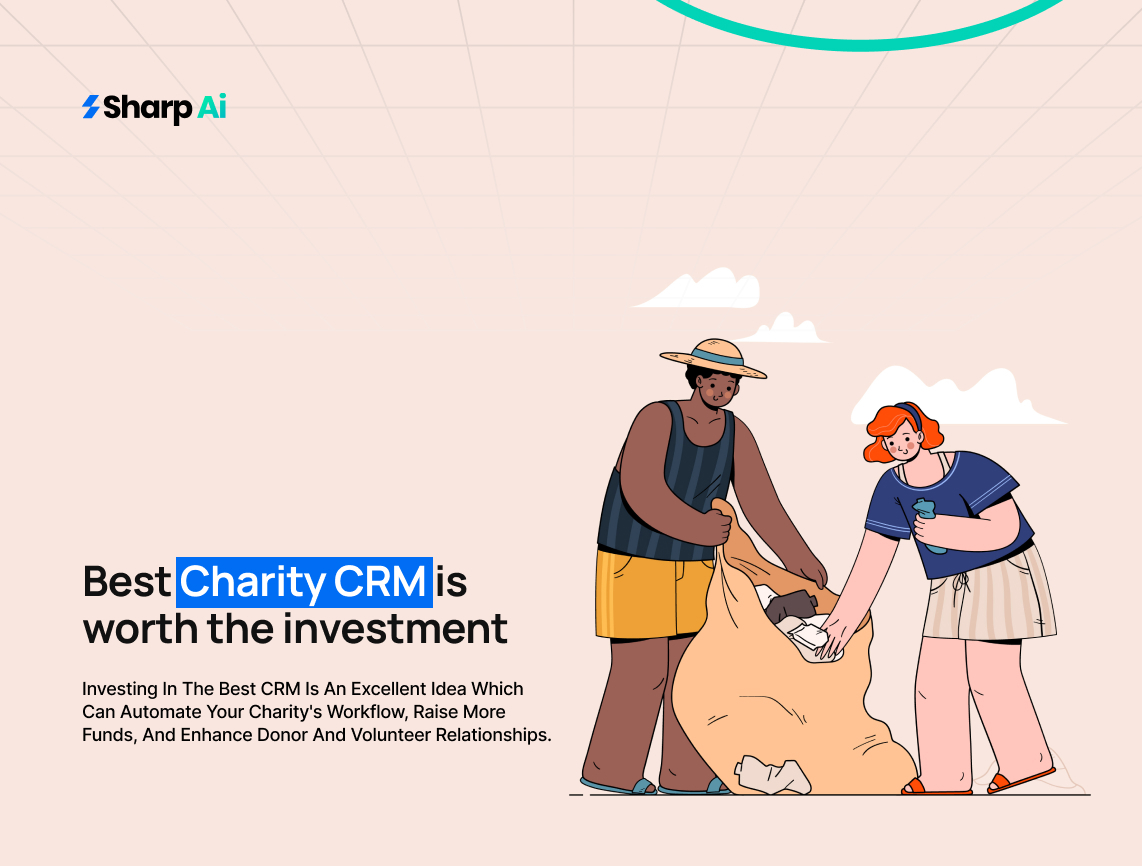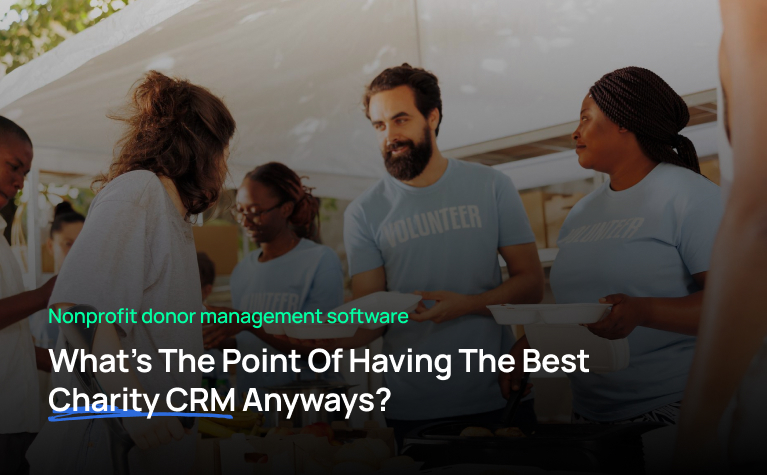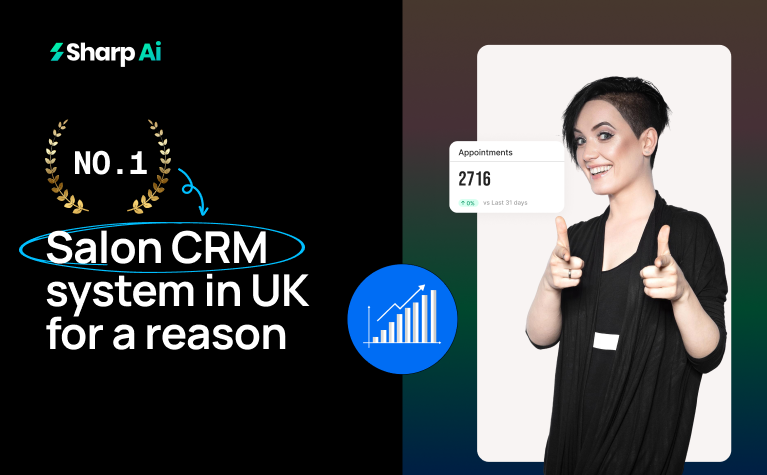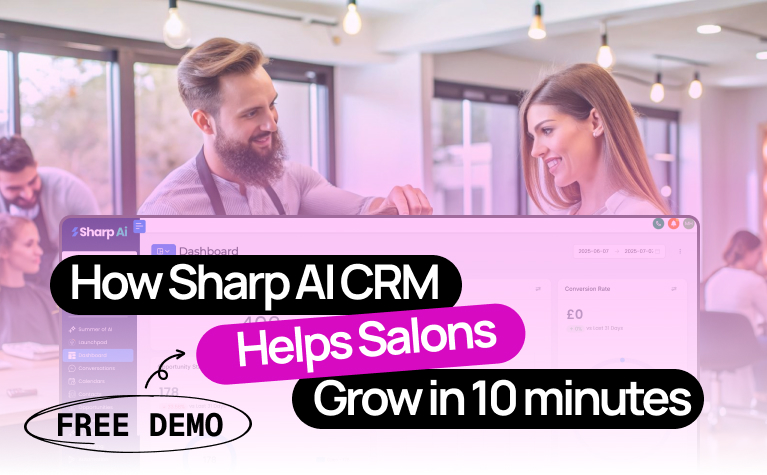“Every mission starts with you,” states Air Ambulance during its Air Ambulance Week 2025 with flights across the UK until 14th September. Such charity foundations are cool and heroic, but did you ever wonder how they run their complex systems and still manage to address any and all emergencies anytime, anywhere? They do it through CRMs! If you’re running a nonprofit organisation and targeting your business growth, saving lives, and doing God’s work, you need an excellent CRM for Smaller Charities .
You must still be wondering, why do I even need a charity CRM software when I can use spreadsheets or manually keep a record? The truth is, your records or sheets can easily be manipulated, lost, and derail your progress. Not only that, your systems lags behind while other foundations utilize the best non profit CRM software for their band growth and awareness. Remember, you need to be fast paced and amp up your charity business to ensure every deserving person reaches out to you.
Sharp AI is the best CRM software that allows your business to thrive in a market where trust is the only factor that allows growth. With this blog, you will understand why you need the best CRM in the first place and why Sharp AI is the best nonprofit donor management software for you.
Why the Right Charity CRM Matters
There’s no one word to answer why the right charity CRM (Customer Management Relationship) is necessary. It piles up on a number of factors that allow CRMs for smaller charities to become applicable and user-friendly while also streamlining operations at the backend.
It should also be noted that not all CRMs are built for the same operations. Some CRMs target fundraising or donor management while others would focus on volunteer tracking or funds management; it is a mix bag of features and focus.
But for your nonprofit organisation, the right CRM software for charities is integral to success and exponential business growth. Having the right CRM impacts how well you comply with regulations all on a single platform. This is why organisations trust Sharp AI. We bring the right CRM that saves your time, reduces errors, and improves efficiency so your donations surge in numbers.
Understanding the True Cost of Ownership for Charity CRM
When using a CRM, there are multi-layered factors that make up for the cost of CRM. These include:
- Licensing costs
- Add-on Costs
- Implementation and Support Fees
- Integration Costs
- Hidden Fees for Data Storage & Backups
- Ongoing Data Maintenance
If your charity collects lots of data whether it’s in the form of donor details, donation history, or event registrations, many CRMs charge additional fees for data storage or cloud backups. Over time, these costs can add up, especially if your charity grows and you need to store more and more data.
You can have a myriad of advantages with Sharp AI. It understands the value of delivering the best CRM software for small business UK and enabling SMEs to prosper. Dedicated to greatness, Sharp AI provides:
- Transparent Pricing
- No Expensive Add-ons
- Minimal Implementation Costs
- Built-in Training and Support
- Efficient Data Handling
- Scalable and Cost-effective
Other CRMs might have lower upfront costs, but the add-on fees and hidden costs soon mount up, and you’re left worse off in the long term. Sharp AI has a clear, fixed cost that comes with everything you need to develop your charity as efficiently as possible, without the added surprises.

Key Features for Charity CRM
When selecting the ideal CRM software, it’s easy to be swept up in the surface-level features such as donor tracking, fundraising, and email management. Let’s explore the critical and technical capabilities that you won’t find in any ordinary CRM.
-
Multi-Dimensional Donor and Volunteer Data Management
Most CRMs are only about one record, yet the optimum customer relationship management software UK provides multi-faceted data handling. This implies you can see the entire history of a relationship, not only single transactions or interactions. An excellent CRM enables charities to handle household relationships, capture interactions through multiple channels, and build 360-degree profiles that integrate donor and volunteer information, offering a complete view of how they have been involved, given, and served.
-
Automated Impact Reporting to Funders
Transparency is paramount in the non profit sector, particularly when dealing with funds. One of the top features of some CRMs is automated, real-time impact reporting for stakeholders and funders. With the top CRM systems, you can automatically report on pre-established KPIs, monitor the performance of fundraising campaigns, and even display outcome-based reporting (e.g., donation usage). This function not only saves time but also allows charities to show precisely how money is being spent to make a difference.
- Built-in Gift Aid Management and Claiming
Gift Aid claiming is an important process for most UK charities. The ideal CRM software should streamline this process through embedded tools that monitor and automatically calculate Gift Aid on qualifying donations. What makes it different is that it can automatically create Gift Aid declarations, making compliance automatic without having to do things manually. With other CRM solutions, you can also monitor donor preferences, manage corrections for rejected claims, and make sure everything is set for easy submission to HMRC.
-
Dynamic Data Segmentation and Predictive Analysis
Segmentation has been around, but dynamic segmentation is not something that most charity CRM systems possess. The more advanced systems allow you to define dynamic segments using live data, say recent interaction, donation size, or even event attendance. These then allow for personalisation of communication, prediction of donor future behaviour, and best outreach planning. Predictive analytics allows charities to learn more about donor lifetime value and streamline fundraising methods.
-
Enhanced Data Security and Encryption Capabilities
In the modern world where everything is digital, data security is all that matters when dealing with sensitive donor data. The CRM you select should be GDPR and other data security regulations compliant. The most secure CRMs offer end-to-end encryption, role-based access controls, and admin user multi-factor authentication (MFA) to ensure donors’ data is secure and only authorized personnel can access sensitive data.

How Does A Charity CRM Handle Contact Data Models?
A CRM provides a structured approach to managing contact data models, allowing charities to track and store donors, volunteers, and other contacts in a centralised system. This includes household relationships, donor segmentation, and interaction history.
For charities, a robust contact data model ensures that no detail is missed, enabling effective communication and relationship building. The best CRM for nonprofits ensures that your data model is scalable and adaptable, growing with your charity.
How Easy Is It to Clean Data and Prevent Duplicates as Your Charity Grows?
The best CRM software for charities comes equipped with duplicate prevention tools and data cleaning features that help charities maintain data accuracy as they scale. These CRMs automatically flag duplicate entries, merge records, and allow for batch data cleansing. As your charity grows, you won’t have to worry about messy data. The customer relationship management software UK takes care of it for you, ensuring your records remain organised.
What’s the Standard Implementation Period for Small Charities?
The average deployment time for small charities on a CRM will be 2 to 4 weeks depending on how complex the charity’s requirements are. For basic processes within the charity, the system can be operational within days. A leading CRM software UK such as Sharp AI provides an easy, quick set up with minimal configurations, allowing your staff to start working right away.
How to Make the Transition from Spreadsheets to CRM?
Transitioning from spreadsheets to a nonprofit CRM encompasses data import, which consists of field mapping from spreadsheets to the CRM and cleaning up irrelevant or incomplete data. A nonprofit CRM solution such as Sharp AI facilitates the transition with seamless data import capabilities. The data migration process usually entails raw data conversion to a format that can work with the CRM system with minimal disruption.
Where is Your Data Located, and What Certifications Are Used in Charity CRM?
Sharp AI’s CRM keeps data in safe, GDPR-compliant data centres inside the UK/EU. It is ISO 27001, Cyber Essentials, and SOC 2 certified, keeping sensitive charity data secure of the highest quality. Your donor data is ensured to be kept safely and in line with compliance requirements.
How Do Charity CRMs Treat Consent, Requests, and Retention Policy?
CRM for Smaller Charities , such as Sharp AI, has inbuilt features to enable charities to capture and control GDPR consent, process data subject access requests (DSARs), and hold retention policies.
You can track consent status simply for all contacts and check compliance with data protection regulations. All these features enable effortless data retention management for any charity.
What Security Features and Certifications Are Included in Charity CRM?
Sharp AI CRM includes end-to-end encryption, multi-factor authentication (MFA), and role-based access controls. The software is completely GDPR-compliant, with the data saved in secure UK/EU-based servers. These security features safeguard donor and volunteer data, keeping it safe from data protection regulations.
Is It Easy to Tailor the Charity CRM for Your Needs?
A CRM is highly customizable and can be tailored as per your own charity needs. With automatic steps, custom steps, and some reports, you can simply tailor the CRM to your charity processes.
How Does Charity CRM Deal with Huge Volumes of Data (Millions of Records)?
CRM has the capability to hold big data, including millions of donor profiles and interactions. The system grows along with your charity, and regardless of the thousands or millions of records, the CRM will remain efficient.
Success Metrics for CRMs for smaller charities to Measure CRM Impact within the First 90-180 Days
In the first 90-180 days, a small charity should track donations, donor retention, and Gift Aid claims to measure CRM impact. SharpAI’s CRM provides real-time insights and automated reports to track these metrics.
What Integrations Are Essential for Small Charities?
Key integrations for small charities include Gift Aid, donation platforms, email/SMS marketing, and accounting tools like Xero/Sage. Sharp AI offers seamless integrations with these tools, ensuring smooth operations without additional costs.
How Does the Charity CRM Scale as the Organisation Grows?
As your charity grows, SharpAI’s charity CRM scales with you. Whether adding new users, records, or custom features, the system can handle the increased demands without a hitch.
Conclusion
To conclude, investing in the best CRM is an excellent idea which can automate your charity’s workflow, raise more funds, and enhance donor and volunteer relationships.
The best CRM not only provides necessary features such as data management, GDPR compliance, and smart integrations, but also inexpensive solutions, ease to use, and scalability to grow with your charity.
By supporting safe handling of data, deleting duplicates, and simplifying fundraising, a proper CRM is an investment that truly earns its keep in the long term, driving growth and efficiency for your organization.





